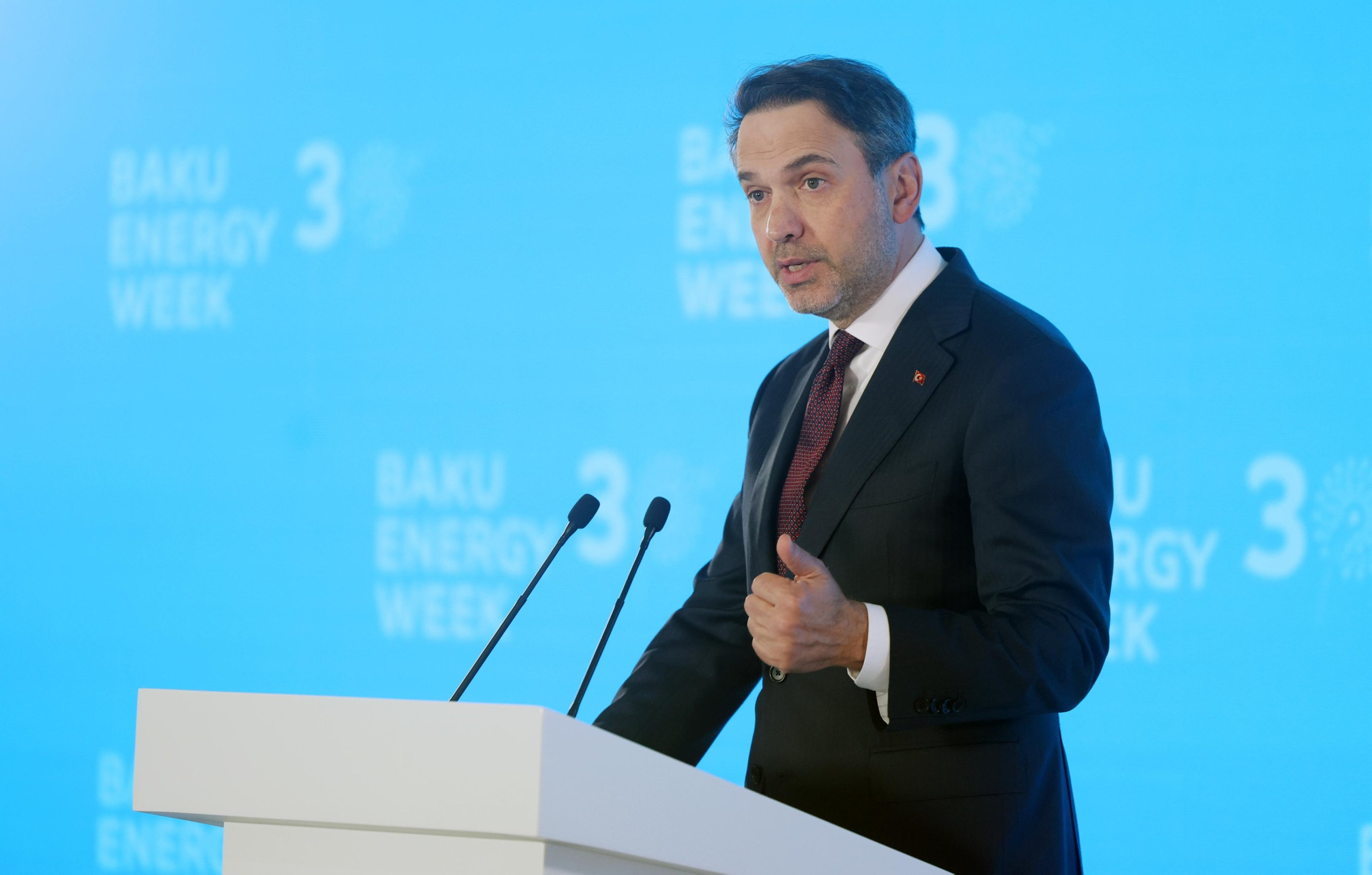© Turkuvaz Haberleşme ve Yayıncılık 2026
Türkiye's state energy company TPAO is joining a major natural gas field off Azerbaijan as a partner, in a deal that will mark a new chapter in bilateral cooperation, Energy and Natural Resources Minister Alparslan Bayraktar announced on Monday.
The gas production-sharing agreement will be signed between TPAO, Azerbaijan’s SOCAR and British energy giant BP on Tuesday and covers the Shafag-Asiman offshore block in the Caspian Sea, Bayraktar told the Baku Energy Week conference.
He described the partnership between Türkiye and Azerbaijan as a “strategic energy alliance built on deep-rooted history, shared culture and a common vision" and said the new deal would enhance joint production in Azerbaijan.
The Shafag-Asiman offshore block has long been viewed as a promising site for hydrocarbon exploration. It is 125 kilometres (78 miles) southeast of Baku and at a depth of 650-800 metres, according to SOCAR's website. The first exploration well was drilled in 2020.
"Hopefully, we will finalize the agreement here. We have acquired a 30% stake. Our partners are SOCAR and BP. We hope to begin production at this field," Bayraktar told reporters on the sidelines of the conference.
In a message sent to the opening ceremony of the event, President Recep Tayyip Erdoğan reaffirmed Türkiye's commitment to deepening energy cooperation with Azerbaijan, calling their joint projects a key to regional and European energy security.
Erdoğan praised the enduring partnership between Ankara and Baku, which he said has been crowned with joint infrastructure projects such as the Baku-Tbilisi-Ceyhan (BTC), Baku-Tbilisi-Erzurum pipelines, and the Trans-Anatolian Natural Gas Pipeline (TANAP).
"Our collaboration not only benefits Türkiye and Azerbaijan but also continues to make significant contributions to the energy security of the region and Europe," said the president.
On the sidelines of the event, Bayraktar held a meeting with Azerbaijani President Ilham Aliyev, which he described as productive, focusing on expanding cooperation across various energy domains.

“TPAO’s presence in Azerbaijan is growing. We’re also discussing collaboration on additional fields and will continue to ramp up our activity in the Caspian Sea,” he said.
Bayraktar echoed Erdoğan's view that Turkish-Azerbaijani energy projects contribute to Europe’s energy security.
“In the coming period, we anticipate new developments regarding projects that aim to deliver gas to Europe from alternative and additional sources,” he said.
He also highlighted Azerbaijan’s increasing investments in renewables and revealed plans for cross-border clean energy infrastructure.
“In the period ahead, we will develop projects for generating renewable energy in Nakhchivan and transporting it to Türkiye, and through Türkiye on to Europe,” he added.
The remarks come at a time of rising global energy uncertainty driven by geopolitical conflicts, aging infrastructure and market volatility.
Erdoğan said global geopolitical developments "have once again highlighted the importance of Türkiye-Azerbaijan cooperation in energy security."
He underlined the significance of the recently inaugurated Iğdır-Nakhchivan pipeline, describing it as "the latest example of our longstanding and successful energy partnership."
The project, which began operation in March, enhances Nakhchivan’s energy supply security and, Erdoğan said, "makes us stronger together."
"Increasing the electricity connection between Türkiye and Azerbaijan is another project of strategic importance for us," he added.
Erdoğan also stressed the need to increase interconnection capacities between Türkiye-Nakhchivan and Türkiye-Georgia. He went on to recall a deal signed in April for cooperation on green electricity transmission and trade between Türkiye, Azerbaijan, Georgia and Bulgaria to establish a new electricity interconnection line.
"This project represents another historic step for our region's energy security and prosperity, and we aim to complete it as soon as possible," the president noted.
Erdoğan emphasized what he said was a major potential for new projects in the natural gas sector between Türkiye and Azerbaijan.
"For many years, Azerbaijan has supplied substantial volumes of gas to both Türkiye and Europe. The strategic role of Azerbaijan in the global energy market is particularly crucial in the current context," he said.
"In the coming period, we have a valuable opportunity to enhance our cooperation in exporting Turkmen gas via Azerbaijan and Türkiye, benefiting all parties involved. This project will contribute to diversifying supply routes and fostering regional prosperity."

Bayraktar emphasized that Türkiye's energy policy is built around three pillars: supply security, reducing import dependency and ensuring affordability.
"To achieve these goals, we are focusing on renewable energy, energy efficiency, nuclear energy, oil and gas development and the development of critical mineral resources," he noted.
Over 60% of Türkiye’s electricity generation now comes from renewable sources, according to Bayraktar.
“At COP29 in Baku last year, we announced our goal to quadruple current wind and solar capacity to 120 gigawatts,” he said. “As a strong start, we added 7 gigawatts of renewable capacity in 2024.”
Bayraktar also cited ongoing infrastructure investments, including high-voltage direct current (HVDC) electric power transmission lines, battery storage, and the anticipated activation of Türkiye’s first nuclear plant at Akkuyu.
Bayraktar also highlighted Türkiye’s ambition to extend its hydrocarbon exploration beyond its traditional geographies.
“We are continuing to invest in domestic hydrocarbon production,” he said. “We are currently producing 9.5 million cubic meters of gas per day from the Sakarya Gas Field. This will double next year and reach 40 million cubic meters daily by 2028.”
He also emphasized Türkiye’s growing focus on critical minerals. “We are actively investing in mining projects both at home and abroad, including rare earth element initiatives,” he said.
